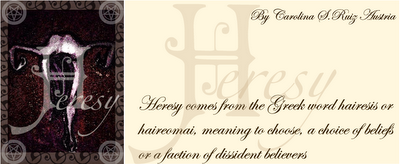Condoms & Catholic Bishops
While there is nothing new nor surprising about a couple of Catholic Bishops being up in arms against the mere mention of condoms in "sex education" classes, or for that matter, even disputing the efficacy of condoms as protection against sexually transmitted diseases in the Philippines, what comes a surprise is the way Filipino Bishops attempt to present the "condom" issue as a settled issue within their own Catholic circles including the Catholic hierarchy.
Catholic Bishops all over the world disagree about condom use and the voice of dissenting Catholics are finally being heard on this especially in relation to HIV AIDS.
Among others, Bishop Godfried Danneels of Belgium, told a Catholic TV program that if an HIV-positive person insists on having sex, "he has to use a condom. Otherwise he will commit a sin" by risking transmission of a potentially fatal virus.
Cardinal Javier Lozano Barragan of Mexico, told The Associated Press that condoms could sometimes be condoned — such as when a woman can't refuse her HIV-positive husband's sexual advances — since preserving her life is paramount. "You can defend yourself with any means," he said. [The Associated Press, March 23, 2004]
The position of the Church against condoms is of course rooted in its procreation and exclusively heterosexual stance on sex based on the 1968 encyclical Humanae Vitae, or "Of Human Life," in which Pope Paul VI asserted the inseparable link between the unifying and reproductive dimensions of sexual intercourse for "husband and wife."
Yet in recent years, the urgent issue of HIV AIDS as well as basic reproductive health care has managed to open up debates over Catholic views on condoms, contraception, sexuality, marriage and even the family.
Issues such as the vulnerability of women and girls as victims of violence whether in the context of a lack of decision-making power in spacing births or frequency in sexual relations with their partners, or right down to being the majority of victims in cases of commercial sexual exploitation,are but some of the potentially explosive areas for debates and discussions around ethical and moral principles.
Indeed, even when it often feels like "Catholic morality" is THE ONLY "moral" position (or claim), it really isn't.
Not even in our predominantly Catholic society since we recognize the importance of a plurality of faiths and even non-religion as a cornerstone of our democracy and constitutional principles on religious freedom.[That is, so far, pre-cha-cha, we do]
As the Filipino Catholic Bishops call for moral values (even if it has a tendency to be simplistically equated with abstinence or sexual restraint), here is hoping that they will welcome a worthy interrogation of the many issues around which the Catholic faith is founded. After all, while it took them over 2000 years, the Vatican did apologize to women (among many others)who suffered because of its errors.(Carolina S. Ruiz Austria, Senior Lecturer, College of Law)
Catholic Bishops all over the world disagree about condom use and the voice of dissenting Catholics are finally being heard on this especially in relation to HIV AIDS.
Among others, Bishop Godfried Danneels of Belgium, told a Catholic TV program that if an HIV-positive person insists on having sex, "he has to use a condom. Otherwise he will commit a sin" by risking transmission of a potentially fatal virus.
Cardinal Javier Lozano Barragan of Mexico, told The Associated Press that condoms could sometimes be condoned — such as when a woman can't refuse her HIV-positive husband's sexual advances — since preserving her life is paramount. "You can defend yourself with any means," he said. [The Associated Press, March 23, 2004]
The position of the Church against condoms is of course rooted in its procreation and exclusively heterosexual stance on sex based on the 1968 encyclical Humanae Vitae, or "Of Human Life," in which Pope Paul VI asserted the inseparable link between the unifying and reproductive dimensions of sexual intercourse for "husband and wife."
Yet in recent years, the urgent issue of HIV AIDS as well as basic reproductive health care has managed to open up debates over Catholic views on condoms, contraception, sexuality, marriage and even the family.
Issues such as the vulnerability of women and girls as victims of violence whether in the context of a lack of decision-making power in spacing births or frequency in sexual relations with their partners, or right down to being the majority of victims in cases of commercial sexual exploitation,are but some of the potentially explosive areas for debates and discussions around ethical and moral principles.
Indeed, even when it often feels like "Catholic morality" is THE ONLY "moral" position (or claim), it really isn't.
Not even in our predominantly Catholic society since we recognize the importance of a plurality of faiths and even non-religion as a cornerstone of our democracy and constitutional principles on religious freedom.[That is, so far, pre-cha-cha, we do]
As the Filipino Catholic Bishops call for moral values (even if it has a tendency to be simplistically equated with abstinence or sexual restraint), here is hoping that they will welcome a worthy interrogation of the many issues around which the Catholic faith is founded. After all, while it took them over 2000 years, the Vatican did apologize to women (among many others)who suffered because of its errors.(Carolina S. Ruiz Austria, Senior Lecturer, College of Law)





0 Comments:
Post a Comment
<< Home